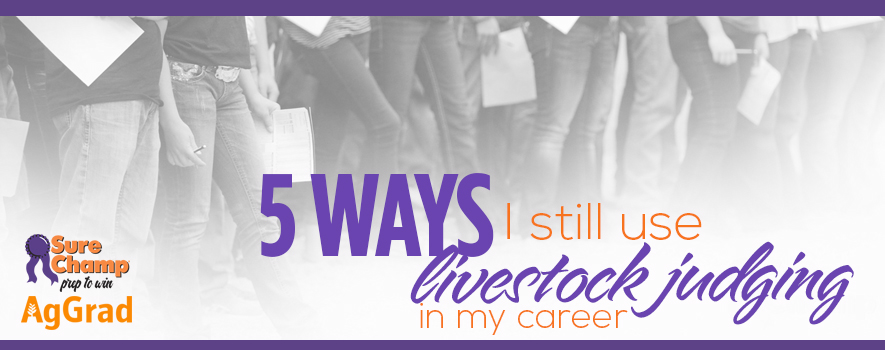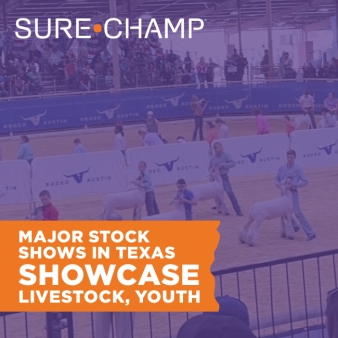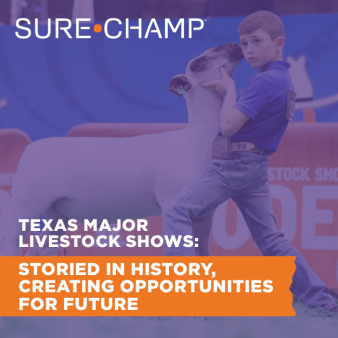
When I was a nine year old 4-H member my dad convinced me that I needed to learn how to judge livestock. He seemed convinced it was my only chance of playing a college “sport”. Turns out he was right, but what I got out of livestock judging was so much more than that.
My 4-H club didn’t have a judging team so dad got me connected with another club to learn the art of evaluating livestock. I think I went to a total of two “workouts” before the one and only contest of the year at the Santa Rosa Jr College. I had been around livestock my whole life but still mostly just followed the “bigger is better” judging philosophy. Although one piece of wisdom from my coach that still sticks to this day is that I wanted a market hog to look like an ice cream cone, meaning narrow up front (base of the cone) and wide at the hams (ice cream). Not sure if that was ever good advice but I never forgot it!
That first contest I think I only placed one out of 12 classes correctly, but I somehow managed to win “Best Junior Reasons”. I found out later this was because I was the only kid under 12 who “memorized” their reasons instead of reading them. Truth is I didn’t know I was supposed to bring a notebook.
But now decades later, in my career I still use knowledge and skills from livestock judging literally every day as an Agricultural Commodity Trader. While I don’t pace back and forth talking to myself or shove little cheap notebooks into the back of my wranglers (true judges know what i’m talking about here!), the training I got from this experience has proven invaluable to me.
Here are 5 ways I still use livestock judging in my career:
1. Thought process. Any and every possible career out there involves learning some sort of thought process. This just refers to the logical steps your brain goes through to arrive at the best possible answer. Whenever I am evaluating someone to see if they are a good candidate to become a trader, I always analyze their thought process. Why do they do what they do? How do they arrive at their decisions? This is what giving reasons at a livestock judging contest is all about: revealing your thought process. This skill has to be developed through practice, and I have my livestock judging training to thank for mine.
2. How to stand up for myself. It’s too easy in most things in life to “stay on the fence”, not “rock the boat” and “fly under the radar” (3 clichés in one sentence!). This isn’t an option in livestock judging. It’s a team sport but you are evaluated individually. No comparing notes before the day is over. You have to learn to make a decision, choose a stance, and defend that stance in front of a judge who likely knows WAY more than you and can see right through all that “smooth talk”. What they don’t tell you at the time is the only way to make an impact in career and life is to stand for something and have the courage to defend what you stand for no matter what others think. That experience will serve you well.
3. Preparation, preparation, preparation. Evaluating animals is not something you can just read a book on or watch a Youtube video about and become an instant expert. Instead it takes you being put in thousands of different situations in order to develop a sound thought process. This can’t be simply learned overnight; it requires extensive practice and preparation. This is how I have found life after college to be. It’s not something that you can pull an “all-nighter” and ace. It requires constant preparation, testing your assumptions, developing your thought processes, and working hard to always try to be the most prepared in the room.
4. Salesmanship. Don’t take this the wrong way, I’m not referring the slick informercial-type sales pitch that with the artificial enthusiasm and “but wait there’s more” taglines. What I’m referring to here is the ability to articulate your ideas in a way that connects with the listener and makes sense. No matter what career field you purse, you will be selling something. I sell commodities, teachers sell information, coaches sell growth, politicians sell their ideas, engineers sell their solutions, and the list goes on and on. Judging showed me how to develop ideas and sell them through the delivery of my reasons.
5. Honesty Wins. My coach always used to tell me “Rule #1: Don’t Lie”. What this means is if you are giving reasons on a class of livestock and every reason you give is the indisputable truth, then you can only be so far off. Perhaps the judge favors the larger framed heifer over the others who were longer, deeper bodied, or more feminine. But if your reasons were honest than worst case you have a difference of priority, and best case you make the judge question whether he or she made the right call themselves. This is 100% true in my career experience as well. People want to work with honest counterparts. Differences of opinion or priorities are going to happen, but if you have a reputation for being an honest “straight shooter”, it will be an enormous asset and open up more doors for you than you ever thought possible.
Finally, I learned from judging how to handle feedback and criticism, and to embrace the fact that I’m not always going to be right, but I can always be improving. Did you judge livestock? How has it helped you in your career? Maybe you had similar experiences with other competitive events.
Thank you to AgGrad for this article. AgGrad was founded in 2015 by Tim Hammerich and Jeremy Turner to develop an online resource for anyone interested in careers in agriculture. The founders believe that students and young professionals entering the workforce rely heavily on internet based research to make career decisions. For years students and employers have both benefited from the traditional college career fair. AgGrad seeks to take this experience and replicate it online so that jobseekers can learn about opportunities, interact and receive feedback, and connect with employers.

